Unit 2 How often do you exercise Section B (1a-1e)课件(共25张PPT)+内嵌音频
文档属性
| 名称 | Unit 2 How often do you exercise Section B (1a-1e)课件(共25张PPT)+内嵌音频 | 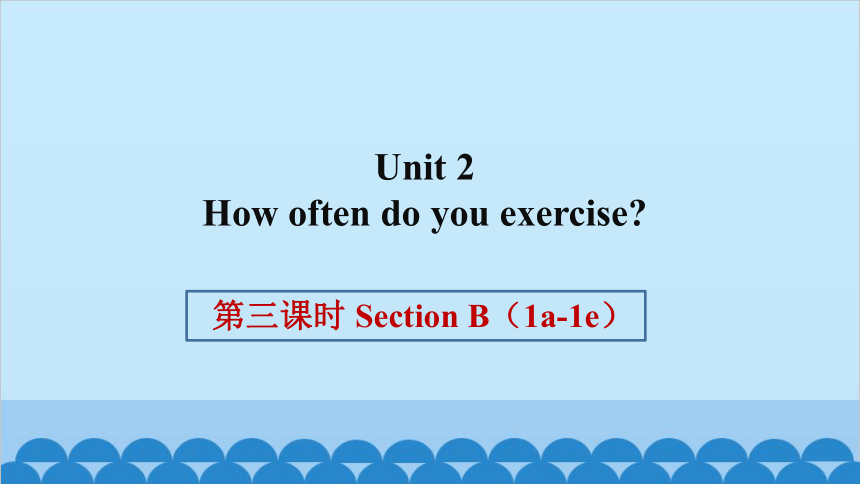 | |
| 格式 | pptx | ||
| 文件大小 | 8.4MB | ||
| 资源类型 | 教案 | ||
| 版本资源 | 人教新目标(Go for it)版 | ||
| 科目 | 英语 | ||
| 更新时间 | 2023-07-17 11:43:36 | ||
图片预览

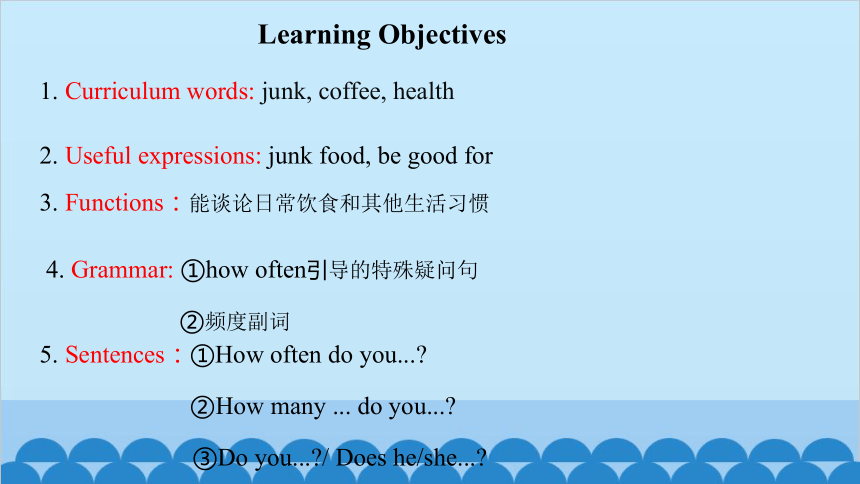
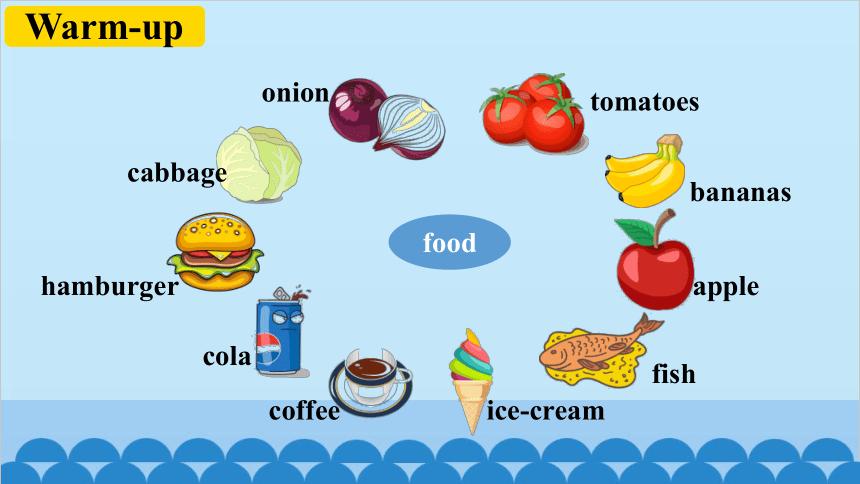
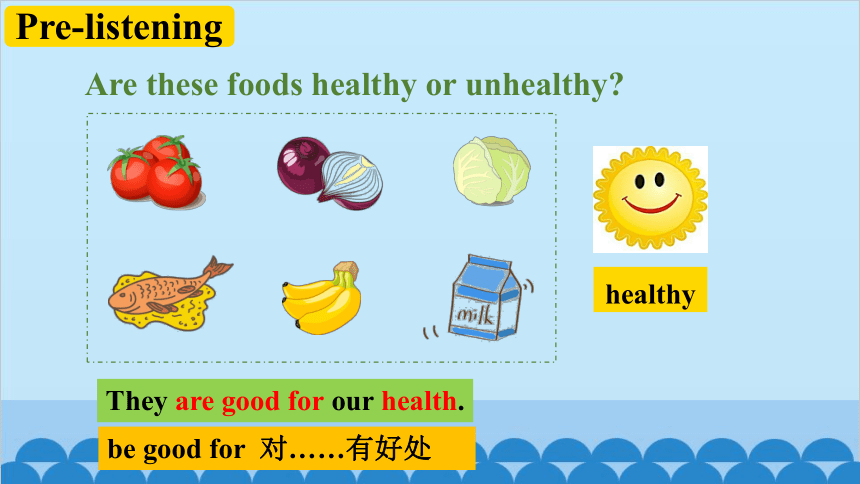
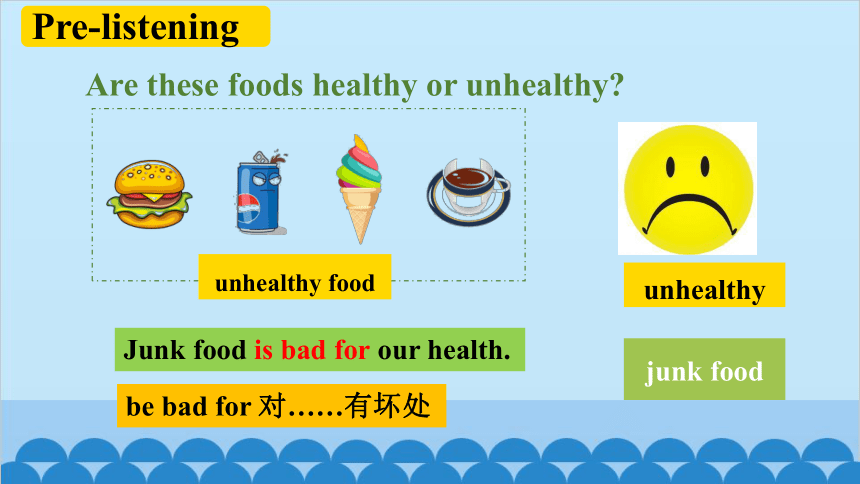
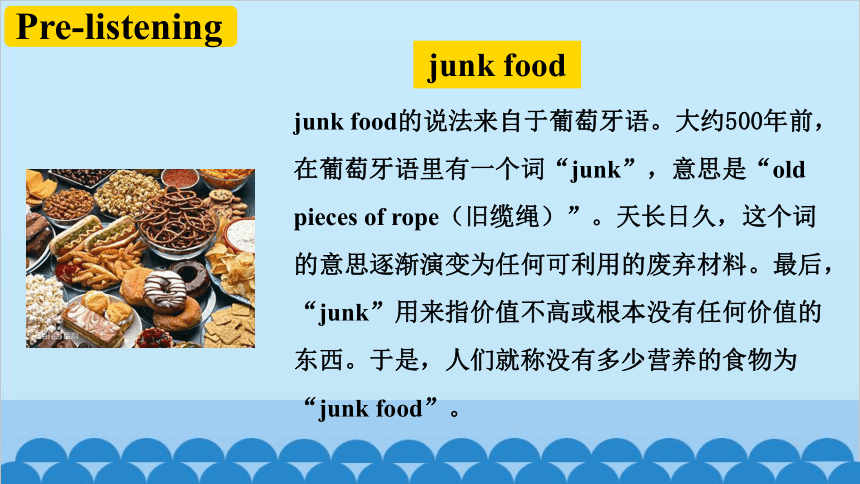
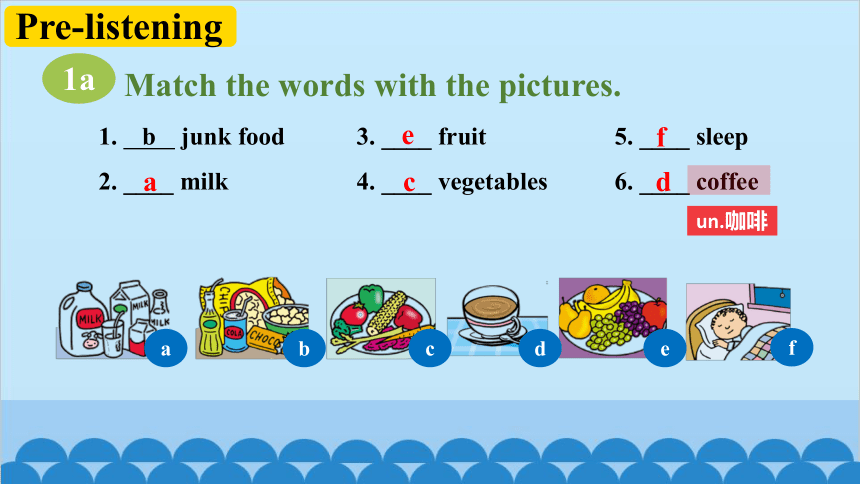
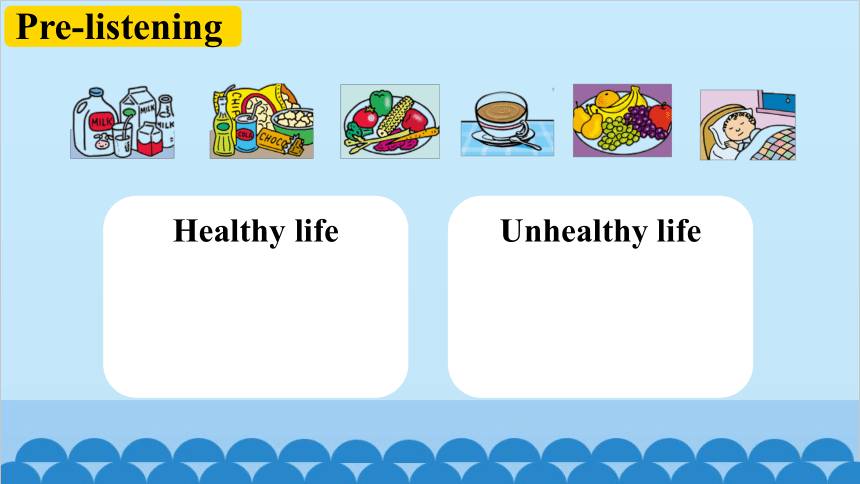
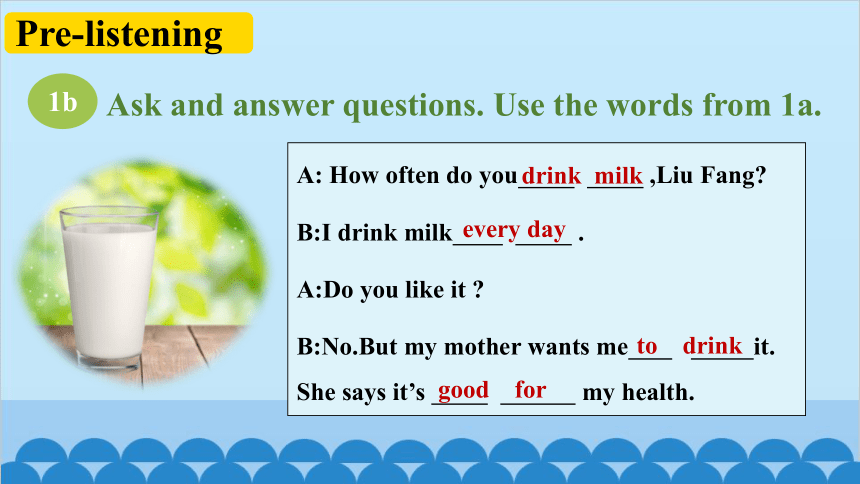
文档简介
(共25张PPT)
Unit 2
How often do you exercise
第三课时 Section B(1a-1e)
1. Curriculum words: junk, coffee, health
5. Sentences:①How often do you...
②How many ... do you...
③Do you... / Does he/she...
2. Useful expressions: junk food, be good for
3. Functions:能谈论日常饮食和其他生活习惯
4. Grammar: ①how often引导的特殊疑问句
②频度副词
Learning Objectives
food
cabbage
onion
tomatoes
bananas
apple
fish
ice-cream
coffee
cola
hamburger
Warm-up
Are these foods healthy or unhealthy
Pre-listening
They are good for our health.
be good for 对……有好处
healthy
Are these foods healthy or unhealthy
junk food
unhealthy food
Pre-listening
Junk food is bad for our health.
be bad for 对……有坏处
unhealthy
junk food的说法来自于葡萄牙语。大约500年前,在葡萄牙语里有一个词“junk”,意思是“old pieces of rope(旧缆绳)”。天长日久,这个词的意思逐渐演变为任何可利用的废弃材料。最后,“junk”用来指价值不高或根本没有任何价值的东西。于是,人们就称没有多少营养的食物为“junk food”。
junk food
Pre-listening
1. b junk food 3. ____ fruit 5. ____ sleep
2. ____ milk 4. ____ vegetables 6. ____ coffee
Match the words with the pictures.
1a
a
b
c
d
e
f
un.咖啡
a
e
c
f
d
Pre-listening
Healthy life
Unhealthy life
Pre-listening
Ask and answer questions. Use the words from 1a.
1b
A: How often do you ,Liu Fang
B:I drink milk .
A:Do you like it
B:No.But my mother wants me it. She says it’s my health.
Pre-listening
drink milk
every day
to drink
good for
Ask and answer questions. Use the words from 1a.
1b
A: How often do you , Liu Fang
B:I drink it.
A:Do you like it
B:Yes.But my mother doesn’t want me it.
She says it’s my health.
Pre-listening
drink coffee
to drink
bad for
hardly ever
While-listening
An interviewer is asking Tina and Bill about their .
eating habits
Listen to an interview about two people's daily habits. Circle your answer to each question.
1c
Does Tina have good habits Yes. No. I don't know.
Does Bill have good habits Yes. No. I don't know.
While-listening
Listen again. Fill in the blanks in the survey.
1d
Questions Tina Bill
1. how often do you exercise ___________ ____________
2. How often do you eat fruit ___________ ____________
3.How many hours do you sleep every night ___________ ____________
4. How often do you drink milk ___________ ____________
5.How often do you eat junk food ___________ ____________
6. How often do you drink coffee ___________ ____________
every day
hardly ever
every day
never
nine
nine
every day
never
two or three times a week
three or four times a week
never
four times a day
Tina
Bill
While-listening
Who is healthier,
Tina or Bill
Interviewer: Hi, Tina and Bill. Let’s start with the first question. How often do you exercise
Tina: Every day.
Bill: Hardly ever.
Interviewer: How often do you eat vegetables and fruit
Tina: I eat vegetables and fruit every day.
Bill: I sometimes eat vegetables. But I never eat fruit.
Interviewer: OK. How many hours do you sleep every night
Tina: Nine.
Bill: Me, too.
Listen and read.
Post-listening
Listen and read.
Interviewer: How often do you drink milk
Bill: Never. I can’t stand milk.
Tina: Oh, I love milk—I drink it every day.
Interviewer: How often do you eat junk food
Bill: I eat it three or four times a week.
Tina: I guess I eat it two or three times a week.
Interviewer: And how often do you drink coffee
Bill: Oh, I drink coffee four times a day.
Tina: I never drink coffee.
Interviewer: Well, thank you very much.
Bill/Tina: You’re welcome.
Post-listening
I think Tina is healthier. Because every day she ,
, . She 2 or 3 times a week.
She never . She nine hours a day.
Bill sleeps nine hours every night, too. Is he healthy No,
because he exercises, eats fruit or drinks milk.
and he eats junk food , drinks coffee .
So he is unhealthy.
Post-listening
Make a report.
exercises
eats fruit
drinks milk
eats junk food
drinks coffee
sleeps
hardly ever
never
4 times a week
4 times a day
Student A is the reporter. Student B is Tina or Bill. Ask and answer questions. Then change roles.
1e
A: How often do you exercise
B: I exercise every day.
A: And how often do you...
Post-listeaning
Language points
1. But my mother wants me to drink it.
want sth. 想要某物
want to do sth. 想要做某事
want sb. (not) to do sth. 想要某人(不)做某事
e.g. The boy wanted noting but freedom.
Do you want to go to the movies with me
The teacher doesn’t want us to eat hamburgers.
Post-listening
Language points
2. She says it’s good for my health.
health作不可数名词,常用短语:be in good/poor health身体好/差。
e.g. Smoking does harm to health.
My grandma is in good health.
【拓展延伸】
health n. 健康
healthy adj. 健康的
healthily adv. 健康地
keep healthy 保持健康
unhealthy adj. 不健康的
Post-listening
同步训练:
1.We should keep _______.
2 .My grandpa is very _______.
3 .Walking is good for your ______.
4 .To be ______,we should eat ________.
5 ._______food is good for our ______.
6 .The child looks very _______.
7 .For our _____,we should have _____ eating habits.
8 .Don’t worry about me, I’m in good ______.
healthy
healthy
health
healthy
healthily
Healthy
health
healthy
health
healthy
health
Post-listening
Language points
2. She says it’s good for my health.
①be good for 对……有好处 be bad for 对……有坏处
e.g. Reading more books is good for us.
②be good at (doing sth.) 擅长于(做)……
e.g. I am good at playing the piano.
③be good with 和……相处得很好
eg: I am good with my teachers.
④be good to 对……很友好=be friendly/nice/kind to
eg: I am good to my pet dog.
Post-listening
is good for
be good to
am good at
2.The young should _________the old.
4.I ___________ playing table tennis.
1.Eating more vegetables __________ your health.
3.Miss Yang ____________ the children. They often play games together.
is good with
同步训练:
Post-listening
单项选择
1
David dislikes coffee, so he _______ drinks it.
A. often B. always C. ever D. never
2
— _______ do you usually watch TV
—Twice a week.
A. How soon B. How often
C. How many D. How long
B
D
Exercises
Fresh air and exercise are good for the ________.
A. health B. healthy C. unhealthy D. healthily
—How often do you eat ________
—I seldom eat junk food.
A. tomatoes B. hamburgers C. fish D. strawberries
单项选择
3
4
A
B
Exercises
Homework
1. Do you know how to keep a healthy lifestyle
Share your ideas with your classmates and
write a report.
2. Preview the new words and phrases in Section
B (2a-2e).
Unit 2
How often do you exercise
第三课时 Section B(1a-1e)
1. Curriculum words: junk, coffee, health
5. Sentences:①How often do you...
②How many ... do you...
③Do you... / Does he/she...
2. Useful expressions: junk food, be good for
3. Functions:能谈论日常饮食和其他生活习惯
4. Grammar: ①how often引导的特殊疑问句
②频度副词
Learning Objectives
food
cabbage
onion
tomatoes
bananas
apple
fish
ice-cream
coffee
cola
hamburger
Warm-up
Are these foods healthy or unhealthy
Pre-listening
They are good for our health.
be good for 对……有好处
healthy
Are these foods healthy or unhealthy
junk food
unhealthy food
Pre-listening
Junk food is bad for our health.
be bad for 对……有坏处
unhealthy
junk food的说法来自于葡萄牙语。大约500年前,在葡萄牙语里有一个词“junk”,意思是“old pieces of rope(旧缆绳)”。天长日久,这个词的意思逐渐演变为任何可利用的废弃材料。最后,“junk”用来指价值不高或根本没有任何价值的东西。于是,人们就称没有多少营养的食物为“junk food”。
junk food
Pre-listening
1. b junk food 3. ____ fruit 5. ____ sleep
2. ____ milk 4. ____ vegetables 6. ____ coffee
Match the words with the pictures.
1a
a
b
c
d
e
f
un.咖啡
a
e
c
f
d
Pre-listening
Healthy life
Unhealthy life
Pre-listening
Ask and answer questions. Use the words from 1a.
1b
A: How often do you ,Liu Fang
B:I drink milk .
A:Do you like it
B:No.But my mother wants me it. She says it’s my health.
Pre-listening
drink milk
every day
to drink
good for
Ask and answer questions. Use the words from 1a.
1b
A: How often do you , Liu Fang
B:I drink it.
A:Do you like it
B:Yes.But my mother doesn’t want me it.
She says it’s my health.
Pre-listening
drink coffee
to drink
bad for
hardly ever
While-listening
An interviewer is asking Tina and Bill about their .
eating habits
Listen to an interview about two people's daily habits. Circle your answer to each question.
1c
Does Tina have good habits Yes. No. I don't know.
Does Bill have good habits Yes. No. I don't know.
While-listening
Listen again. Fill in the blanks in the survey.
1d
Questions Tina Bill
1. how often do you exercise ___________ ____________
2. How often do you eat fruit ___________ ____________
3.How many hours do you sleep every night ___________ ____________
4. How often do you drink milk ___________ ____________
5.How often do you eat junk food ___________ ____________
6. How often do you drink coffee ___________ ____________
every day
hardly ever
every day
never
nine
nine
every day
never
two or three times a week
three or four times a week
never
four times a day
Tina
Bill
While-listening
Who is healthier,
Tina or Bill
Interviewer: Hi, Tina and Bill. Let’s start with the first question. How often do you exercise
Tina: Every day.
Bill: Hardly ever.
Interviewer: How often do you eat vegetables and fruit
Tina: I eat vegetables and fruit every day.
Bill: I sometimes eat vegetables. But I never eat fruit.
Interviewer: OK. How many hours do you sleep every night
Tina: Nine.
Bill: Me, too.
Listen and read.
Post-listening
Listen and read.
Interviewer: How often do you drink milk
Bill: Never. I can’t stand milk.
Tina: Oh, I love milk—I drink it every day.
Interviewer: How often do you eat junk food
Bill: I eat it three or four times a week.
Tina: I guess I eat it two or three times a week.
Interviewer: And how often do you drink coffee
Bill: Oh, I drink coffee four times a day.
Tina: I never drink coffee.
Interviewer: Well, thank you very much.
Bill/Tina: You’re welcome.
Post-listening
I think Tina is healthier. Because every day she ,
, . She 2 or 3 times a week.
She never . She nine hours a day.
Bill sleeps nine hours every night, too. Is he healthy No,
because he exercises, eats fruit or drinks milk.
and he eats junk food , drinks coffee .
So he is unhealthy.
Post-listening
Make a report.
exercises
eats fruit
drinks milk
eats junk food
drinks coffee
sleeps
hardly ever
never
4 times a week
4 times a day
Student A is the reporter. Student B is Tina or Bill. Ask and answer questions. Then change roles.
1e
A: How often do you exercise
B: I exercise every day.
A: And how often do you...
Post-listeaning
Language points
1. But my mother wants me to drink it.
want sth. 想要某物
want to do sth. 想要做某事
want sb. (not) to do sth. 想要某人(不)做某事
e.g. The boy wanted noting but freedom.
Do you want to go to the movies with me
The teacher doesn’t want us to eat hamburgers.
Post-listening
Language points
2. She says it’s good for my health.
health作不可数名词,常用短语:be in good/poor health身体好/差。
e.g. Smoking does harm to health.
My grandma is in good health.
【拓展延伸】
health n. 健康
healthy adj. 健康的
healthily adv. 健康地
keep healthy 保持健康
unhealthy adj. 不健康的
Post-listening
同步训练:
1.We should keep _______.
2 .My grandpa is very _______.
3 .Walking is good for your ______.
4 .To be ______,we should eat ________.
5 ._______food is good for our ______.
6 .The child looks very _______.
7 .For our _____,we should have _____ eating habits.
8 .Don’t worry about me, I’m in good ______.
healthy
healthy
health
healthy
healthily
Healthy
health
healthy
health
healthy
health
Post-listening
Language points
2. She says it’s good for my health.
①be good for 对……有好处 be bad for 对……有坏处
e.g. Reading more books is good for us.
②be good at (doing sth.) 擅长于(做)……
e.g. I am good at playing the piano.
③be good with 和……相处得很好
eg: I am good with my teachers.
④be good to 对……很友好=be friendly/nice/kind to
eg: I am good to my pet dog.
Post-listening
is good for
be good to
am good at
2.The young should _________the old.
4.I ___________ playing table tennis.
1.Eating more vegetables __________ your health.
3.Miss Yang ____________ the children. They often play games together.
is good with
同步训练:
Post-listening
单项选择
1
David dislikes coffee, so he _______ drinks it.
A. often B. always C. ever D. never
2
— _______ do you usually watch TV
—Twice a week.
A. How soon B. How often
C. How many D. How long
B
D
Exercises
Fresh air and exercise are good for the ________.
A. health B. healthy C. unhealthy D. healthily
—How often do you eat ________
—I seldom eat junk food.
A. tomatoes B. hamburgers C. fish D. strawberries
单项选择
3
4
A
B
Exercises
Homework
1. Do you know how to keep a healthy lifestyle
Share your ideas with your classmates and
write a report.
2. Preview the new words and phrases in Section
B (2a-2e).
同课章节目录
- Unit 1 Where did you go on vacation?
- Section A
- Section B
- Unit 2 How often do you exercise?
- Section A
- Section B
- Unit 3 I'm more outgoing than my sister.
- Section A
- Section B
- Unit 4 What's the best movie theater?
- Section A
- Section B
- Unit 5 Do you want to watch a game show?
- Section A
- Section B
- Unit 6 I'm going to study computer science.
- Section A
- Section B
- Unit 7 Will people have robots?
- Section A
- Section B
- Unit 8 How do you make a banana milk shake?
- Section A
- Section B
- Unit 9 Can you come to my party?
- Section A
- Section B
- Unit 10 If you go to the party, you'll have a grea
- Section A
- Section B
